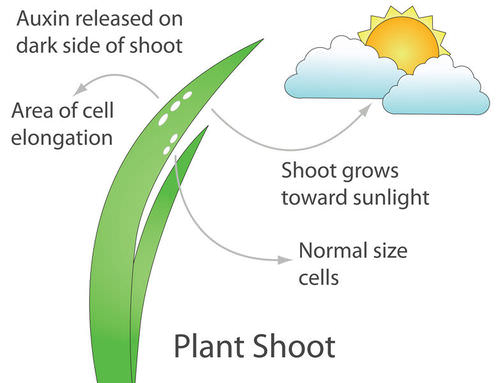9.23 植物对策
章节大纲
-
So what happens to a vineyard in the middle of winter?
::那么冬天的葡萄园怎么办?The vines cannot die each year. Instead, the plants go into a state of dormancy , almost as if they are taking a long nap.
::葡萄不能每年死亡。相反,植物进入了宿舍状态,几乎仿佛它们睡了很久。Plant Responses
::植物农药Like all organisms , plants detect and respond to stimuli in their environment. Unlike , plants can’t run, fly, or swim toward food or away from danger. They are usually rooted to the soil . Instead, a plant’s primary means of response is to change how it is growing. Plants also don’t have a to control their responses. Instead, their responses are generally controlled by , which are chemical messenger molecules.
::像所有生物一样,植物检测和应对环境刺激。 与植物无法运行、飞翔或游向食物或远离危险不同,植物通常植根于土壤。 相反,植物的主要反应手段是改变其生长方式。 植物也没有控制其反应的能力。 相反,植物的反应通常受化学传递分子的控制。Plant Tropisms
::植物作物作物Plant always grow downward because specialized in root caps detect and respond to gravity. This is an example of a . A tropism is a turning toward or away from a stimulus in the environment. Growing toward gravity is called geotropism . Plants also exhibit phototropism , or growing toward a light source. This response is controlled by a hormone called . As shown in Figure , auxin stimulates cells on the dark side of a plant to grow longer. This causes the plant to bend toward the light.
::植物总是会因为专门研究根盖和对重力作出反应而向下生长。这是一个例子。一对流是环境刺激的向向或向外转变。向重力的成长被称为地球原生物。植物也表现出光种主义,或向光源增长。这种反应是由一种叫作荷尔蒙的荷尔蒙控制的。如图所示,树脂刺激细胞在植物的阴暗面上生长得更长。这导致植物向光向弯曲。Phototropism is controlled by the growth hormone auxin.
::光作物主义受生长激素原素的控制。Daily and Seasonal Responses
::每日和季节性回应Plants also detect and respond to the daily cycle of light and darkness. For example, some plants open their leaves during the day to collect sunlight and then close their leaves at night to prevent loss. Environmental stimuli that indicate changing seasons trigger other responses. Many plants respond to the days growing shorter in the fall by going dormant . They suspend growth and in order to survive the extreme cold and dryness of winter. Dormancy ensures that seeds will germinate and plants will grow only when conditions are favorable.
::植物还检测和应对光和黑暗的日常循环,例如,一些植物白天打开树叶以收集阳光,然后在夜间关闭树叶以预防损失。表明季节变化的环境刺激触发了其他反应。许多植物通过休眠来应对秋天中生长更短的日数。它们暂停生长,以生存极端寒冷和干燥的冬季。它们确保种子发芽,只有在条件有利时才能生长。Responses to Disease
::应对疾病和疾病Plants don’t have immune systems, but they do respond to disease. Typically, their first line of defense is the death of cells surrounding infected tissue . This prevents the infection from spreading. Many plants also produce hormones and toxins to fight . For example, willow trees produce salicylic acid to kill . The same compound is used in many acne products for the same reason. Exciting new research suggests that plants may even produce chemicals that warn other plants of threats to their health, allowing the plants to prepare for their own defense. As these and other responses show, plants may be rooted in place, but they are far from helpless.
::植物没有免疫系统,但是它们的确对疾病有反应。 通常,它们的第一道防线是感染组织周围细胞的死亡。这防止了感染的蔓延。许多植物也会产生荷尔蒙和毒素来抗争。例如,柳树生产硅酸来杀死。同一化合物也用于许多丙烷产品,原因也是一样的。 令人振奋的新研究表明,植物甚至可以生产化学剂来警告其他植物的健康受到威胁,让植物为自己的防御做好准备。 这些和其他反应都表明,植物可能扎根于原地,但它们远非无助。Science Friday : Plants in Space!
::科学星期五:太空植物!For humans to travel to the Moon and Mars, astronauts will need to understand how to grow plants in extreme climates in order to help them stay alive. In this video by Science Friday , Dr. Anna-Lisa Paul and Dr. Robert J. Ferl send weeds to space to study their behavior on a molecular level.
::为了让人类前往月球和火星,宇航员需要了解如何在极端气候条件下种植植物,以帮助他们生存。 在科学周五的这段视频中,安娜-莉萨·保罗博士和罗伯特·费尔博士将杂草送去太空研究分子层面的行为。Summary
::摘要-
Like all organisms, plants detect and respond to stimuli in their environment. Their main response is to change how they grow.
::像所有生物一样,植物检测和应对其环境中的刺激作用,其主要反应是改变其生长方式。 -
Plant responses are controlled by hormones. Some plant responses are tropisms.
::植物反应受荷尔蒙控制,有些植物反应是对流反应。 -
Plants also respond to daily and seasonal cycles and to disease.
::植物还应对日常和季节周期以及疾病。
Review
::回顾-
What is the primary way that plants respond to environmental stimuli? What controls their responses?
::植物应对环境刺激的主要方式是什么? 什么控制着它们的应对? -
Define tropism. Name one example in plants.
::定义三流。 请举植物中的一个例子 。 -
State ways that plants respond to disease.
::说明植物对疾病的反应方式。 -
Why is it adaptive for plants to detect and respond to daily and seasonal changes?
::为什么对植物进行检测和应对日常和季节性变化具有适应性?
-
Like all organisms, plants detect and respond to stimuli in their environment. Their main response is to change how they grow.

